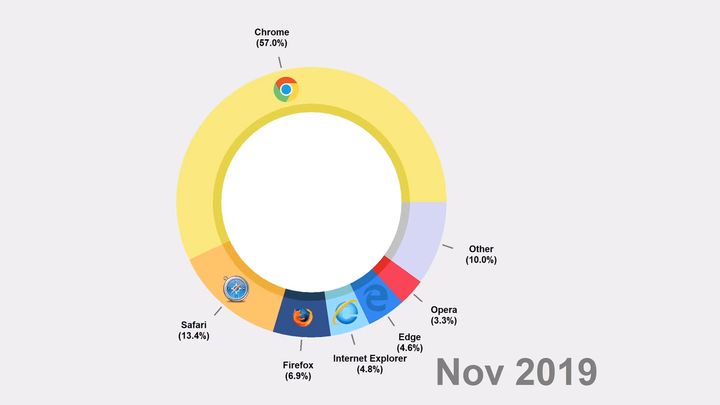Battle of Web Browsers Across the Last 25 Years
Pie Chart Pirate channel published a video, showing the evolution of popularity of individual web browsers between 1994-2019.
1

IN A NUTSHELL:
- Pie Chart Pirate channel features a video summarizing changes in the popularity of web browsers between 1994-2019;
- The title of leader was held successively by Netscape, Internet Explorer and Google Chrome;
- Currently, the most popular browser is Google Chrome - 71.7% of PC users and 63.7% of mobile device owners rely on this app.
Pie Chart Pirate channel on YouTube features various analyses concerning, among others, the Internet, social issues, economy or politics. It is worth noting the video that summarizes the evolution of the popularity of web browsers over the years - from 1994 to 2019.
Initially, by far the most popular was Netscape, which was used by over 80% of users. This solution began to lose its popularity at the time when Internet Explorer entered the market. In the spring of 1998, Microsoft's browser took over the the lead, and in the following years it completely dominated the Internet - in October 2002 it was used by over 95% of Internet users.
It was at the end of 2002 that another breakthrough moment came - the appearance of Mozilla Firefox. It gradually gained popularity at the expense of Internet Explorer, although it was never given the chance to sit in the chair of the leader (at the peak it had 33.1% market share). What Firefox failed to do was achieved in February 2012 by Google Chrome - when was used by 28.2% of Internet users (Internet Explorer recorded a result 0.1% worse, while Mozilla's program had a 7.7% loss to Chrome).
The following years were a period of growing domination of Google's browser. It is also worth noting the success of Safari, associated with the strengthening of Apple's position - since February 2014, the company's browser is the second most popular program for surfing the Internet. At its peak, the application could boast 20.8%, but then its popularity dropped noticeably (to 13.4% in November 2019).
According to statistics from Netmarketshare, in July 2020, Chrome was already used by 71.7% of Internet users, in this case the data includes only PC apps. That's why Microsoft Edge came in second (with the result of 8.09%), which in April pushed Firefox down from the second spot (currently Mozilla's browser is preferred by 7.36% of Internet users). In the case of mobile devices, the domination of Google applications is slightly lower (63.3%), but it still has almost 36% advantage over Safari (26.7% of smartphone and tablet users reach for Apple).
1
Latest News
- This is expected to be the biggest year in the company's history. Blizzard prepares an offensive that will overshadow previous years
- Bethesda envied CD Projekt RED? Starfield may undergo a Cyberpunk 2077-style metamorphosis
- Season 2 has just started, and Todd Howard is already writing the script for the third one. Fallout 5 will be changed by the TV show
- 5 games to grab on Amazon Prime Gaming. Among them, a collection of RPG classics
- My experience attending the 2025 Game Awards, and why I loved it

